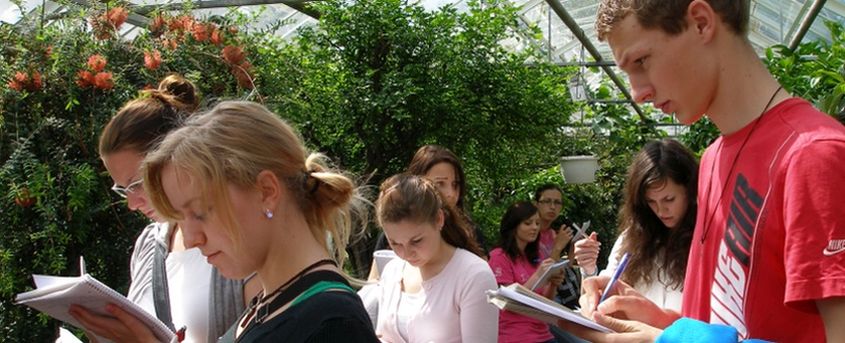Basic information
Understand the functioning of nature, landscape and the environment for their protection
The Department of Ecology and Environmental Sciences is the oldest department of ecology in the Czech Republic. With more than 30 years of tradition, we provide education and conduct research in the field of ecology and environmental sciences. We are a modern and dynamically growing academic department with experts in various fields maintaining a strong international collaboration. Our goal is to advance and share fundamental discoveries in ecology and apply them to key environmental challenges that our society faces today.
Whether studying the population dynamics of species, microbial activity of water, soil quality or ecosystem services in farmland, we utilize ecological approaches and promote public engagement to solve local and global environmental challenges. Working at the intersection of basic and applied science, we educate our students and inspire professionals and the public towards a better understanding of the living world around us, and ultimately adopting a more sustainable approach to the environment.
Study
We educate experts for state administration, local government and the private sector, for consultancy and project offices, nature conservation and landscape management. Our graduates will also find employment in research and education.
We offer all levels of university studies (in Czech):
Bakalářské studijní programy:
- Ekologie a ochrana životního prostředí
- Biologie a environmentální výchova (učitelský program)
Navazující magisterské studijní programy:
- Ekologie a ochrana životního prostředí
- Ochrana a tvorba krajiny
- Hydrobiologie
- Učitelství biologie a environmentální výchovy pro střední školy
Doktorský studijní program
- Ekologie a ochrana životního prostředí
Research
Ecology is a biological science that has changed into a mature academic discipline with a rich theoretical background in recent decades. The concept of ecology can now be found almost everywhere. However, the field has to pay for this popularity a cruel tax - emptying the content for the general public, where everyone fills their own content. However, in the academic concept that is being developed and also taught at natural sciences, the definition of ecology is still the same: studying relationships that have living organisms among themselves or with the environment. In principle, humans are not discussed in ecology. Problems are usually studied at the individual level, population or community level and take place on a variety of time and space scales. Thus, ecology distinguishes itself both from nature conservation biology and from environmental sciences that address environmental issues related to human activity. Ecology is no longer a social movement that does not explore and has a clear ideological idea of the world, including human behaviour.
The research activities of the members of the Department are divided into seven main research groups:
- population ecology, demography and dynamics of mammalian populations
- ecology and conservation biology of invertebrates
- the impact of climate and anthropogenic changes in mountain ecosystems
- agroecology and soil ecology
- microbial ecology of waters
- landscape ecology, landscape fragmentation issues, revitalization, biodiversity, migration, species distribution modelling
- biodiversity of tropical rain forests
Cooperation
The Department cooperates with a number of partner entities (universities, research institutes, etc.) both within the Czech Republic and abroad. Members of the department also participate in the advisory boards of the PLA and NP, in scientific and editorial boards, in field commissions and in a number of national and international professional associations (e.g. Center International du Myriapodology, Czech Limnological Society, Czech Pedological Society, Czech Society for Landscape Ecology, CZ-IALE, Czechoslovak Society of Microbiology, Entomological Society, International Union of Soil Sciences, International Society of Organic Agriculture Research, Zoological Society. The department staff teach at partner universities (the University of South Bohemia in České Budějovice, Masaryk University in Brno, Mendel University of Agriculture and Forestry in Brno, University of Ostrava, Charles University in Prague and others).
Graduate students
Our graduate students are successful in the labour market. They are able to find employment in various organizations such as the state administration (eg the Environmental Department), the Agency for Nature Conservation and Landscape Protection, the Administration of Protected Landscape Areas (Správa chráněných krajinných oblastí CHKO), and National Parks (Národní parky NP). Some find employment in science and research (academic institutions, museums, universities), private firms in the field of the natural environment (expert opinions, planning activities, counselling, revitalization, tourism), or also in school and extracurricular pedagogy (primary, secondary, university, Environmental Education Centers, DDM). They leave a significant mark in the field of education, our former students include a number of successful academics and, above all, quality teachers.
Graduate students of the Faculty of Science
Did the university and the city grow to your heart during your studies? Do you remember classmates with whom you sat over scripts, wrote essays, took exams and celebrated successes? Do you remember lectures, teachers, Olomouc cafes, pubs, playgrounds and parks? The university remembers you too: where did you go with your diploma after the final test, where did destiny and professional challenges got you, how are you doing? Let us know about yourself.
